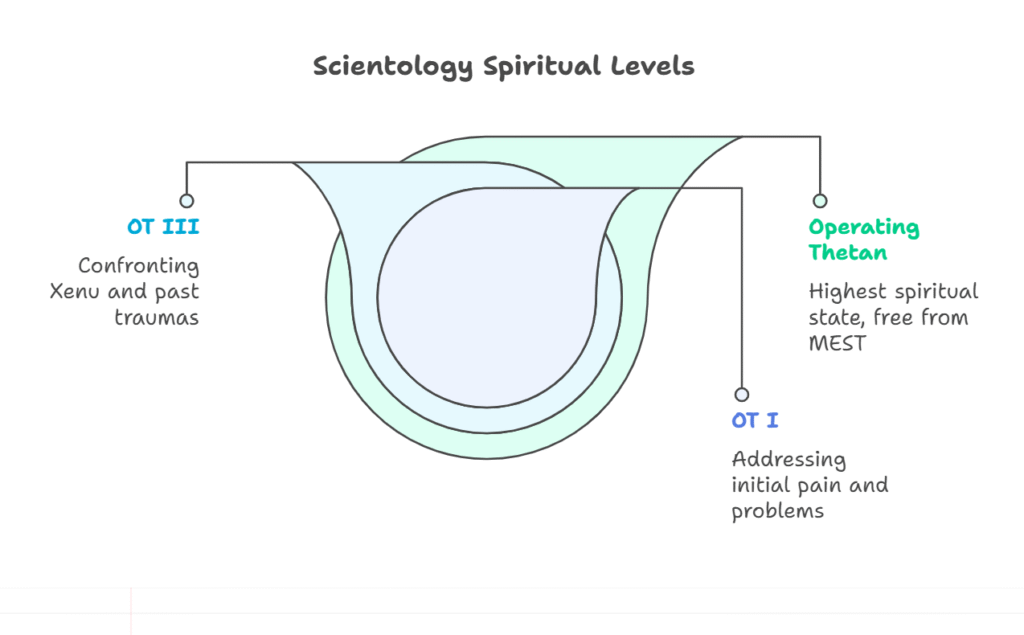Scientology beliefs have fascinated and baffled people for decades. Why does a religion founded by a science fiction author have millions of followers worldwide, yet remain shrouded in controversy? If you’ve ever wondered what Scientology truly teaches—or why it’s both revered and ridiculed—you’re in the right place. Buckle up; we’re diving deep into the world of Dianetics, Xenu, and Thetans.
What is Scientology, Anyway? A Quick Primer
Before we dissect scientology beliefs, let’s clear the air: what is a Scientologist? In simple terms, a Scientologist is someone who follows the teachings of L. Ron Hubbard, a pulp fiction writer turned spiritual leader. Born in 1911, Hubbard crafted a belief system that blends elements of psychology, philosophy, and—yes—science fiction. His 1950 book, Dianetics: The Modern Science of Mental Health, became the foundation. Fast forward to 1954, and Hubbard founded the Church of Scientology, promising followers a path to ultimate freedom, happiness, and even immortality.
But here’s the kicker: Scientology isn’t just about self-help or personal growth. It’s a full-fledged spiritual framework with its own cosmology, jargon, and hierarchical structure. Think of it as a hybrid between a therapy session and a cosmic adventure movie.
The Core of Scientology Beliefs: The Reactive Mind
At the heart of scientology beliefs lies the concept of the Reactive Mind. According to Hubbard, your brain is essentially a hard drive cluttered with “engrams”—painful, unconscious memories that hold you back. These engrams stem from traumatic events, starting from birth (or even before). They’re like digital viruses, causing irrational fears, addictions, and failures.
Scientologists believe that by undergoing auditing (a mix of counseling and confession), you can rid yourself of these engrams and achieve Clear status—the first major milestone in Scientology’s spiritual ladder. Sounds logical, right? Erase the mental junk, become a better human. But here’s where things take a wild turn.
Real Talk from a Former Scientologist:
“I spent years climbing Scientology’s ranks, shelling out thousands for courses and auditing sessions. It felt empowering at first—until I realized I was trapped in a system that demanded absolute loyalty. The ‘freedom’ they promised? It was just a sales pitch.”
Why Is Scientology Hated? The Dark Side of the Faith
Now, let’s address the elephant in the room: why is Scientology hated by so many? Critics argue it’s a cult masquerading as a religion, with ex-members sharing horror stories of:
- Financial Exploitation – Courses cost upwards of $4,000, and auditing sessions? Easily $500+ per hour.
- Disconnection Policy – Members are often forced to cut ties with “SPs” (Suppressive Persons), including family and friends who question the church.
- Litigation Tactics – Scientology is notorious for suing critics into silence.
- Bizarre Cosmology – We’ll get to Xenu and the Galactic Confederacy in a minute. Trust me, it’s…interesting.
Detractors see Hubbard’s teachings as a pyramid scheme with spiritual window dressing. Supporters, however, call it a misunderstood path to enlightenment. Who’s right? Let’s explore further.
Scientology Courses: The Gateway to Spiritual “Progress”
Curious about scientology courses? They range from beginner-friendly workshops like “Dianetics” (intro to Reactive Mind theory) to esoteric classes like “OT VIII: The Truth Revealed” (for the elite few). Here’s the breakdown:
| Course Level | Focus | Cost (Approx.) |
|---|---|---|
| Dianetics Auditor | Learn to run auditing sessions (on others or yourself). | $4,000+ |
| Method One Instructor | Teach Hubbard’s techniques to new recruits. | $2,500+ |
| Thetan Operating Levels (OT I–VIII) | Advanced spiritual states. Only for “Clears” with years of auditing. | 15,000–15,000–40,000 |
Each course promises transformative insights, but critics warn: the real transformation is how quickly your bank account shrinks.
Climbing the Ranks: Scientology Levels Explained
Ever wondered what scientology levels mean? It’s not just about spiritual growth; it’s a structured journey with eight Operating Thetan (OT) levels. Here’s a sneak peek:
- OT III: The Wall of Fire – Learn about Xenu (yes, that Xenu – more soon).
- OT I: The Pain and the Problem – Confront your past traumas.
- OT VIII: Operating Thetan – The highest “attainable” state. You’re now a spiritual being, free from the MEST universe (matter, energy, space, time).
Reaching OT VIII? That’s like winning Scientology’s spiritual Oscars. But at what cost? Members often spend decades and $100,000+ to get there.

The Bizarre Truth: Xenu, Thetans, and Galactic Wars
Time for the part that makes scientology beliefs sound like a cosmic blockbuster: the story of Xenu. At OT III (a $7,000+ course), you’re told:
75 million years ago, Xenu, the dictator of the Galactic Confederacy, dumped 13.5 trillion aliens on Earth (then called Teegeeack). He stacked them around volcanoes, nuked them with H-bombs, and captured their souls (Thetans). These Thetans cling to humans today, causing suffering. Your goal? Free yourself from these “body thetans” via auditing.
Yep, it sounds absurd. But for Scientologists, this narrative explains human misery, reincarnation, and the path to godhood. It’s science fiction turned theology. Fans see it as profound; skeptics call it Hubbard’s wild imagination.
The Human Cost: Stories from Inside Scientology
Let’s humanize this: Meet “Sarah,” a former Scientologist who rose to OT V before bailing out. She recalls:
“Auditing sessions turned into emotional minefields. I’d relive childhood abuse, convinced it held the key to enlightenment. But when I questioned Xenu’s story, I was labeled ‘SP’ and shunned by my own church friends. The ‘freedom’ Hubbard promised? It was control, wrapped in spiritual jargon.”
Stories like Sarah’s fuel the why is Scientology hated debate. Supporters retort: “You just didn’t go deep enough.” Critics snap: “This isn’t spirituality; it’s psychological manipulation.”
The Verdict: Pros, Cons, and Risks in 2025
Is Scientology a life-changing cult or a legit path to self-discovery? Here’s the balanced truth:
Pros:
- Community Support: Members find lifelong friendships and purpose.
- Psychological Tools: Auditing can genuinely help process trauma (minus the sci-fi fluff).
- Philanthropy: Scientology funds drug rehab programs, disaster relief, and literacy initiatives.
Cons:
- Exorbitant Costs: Your wallet dies a slow death.
- Emotional Manipulation: Questioning Hubbard’s teachings? You’re “betraying” the cause.
- Legal Intimidation: Critics are silenced via lawsuits and smear campaigns.
The Risk Factor: In 2025, with social media amplifying whistleblower stories, joining Scientology means risking your reputation—and relationships. Ex-members often describe it as escaping a “spiritual hostage situation.”
Frequently Asked Questions
Q: Is Scientology a cult or a religion?
A: Legally, it’s a tax-exempt religion (U.S. 1993). Socially? Many label it a cult due to its coercive tactics, hierarchical control, and profit-driven model. Decide for yourself.
Q: What do Scientologists believe happens after death?
A: Here’s the twist: you don’t die. Your “Thetan” (immortal soul) reincarnates, stuck in a cycle until you reach OT VIII. Then, you graduate to spiritual omnipotence. Mind blown, right?
Q: Can you leave Scientology without consequences?
A: Technically, yes. Realistically, no. Expect disconnection from loved ones still inside, plus online harassment from “Scientology defenders.” It’s not a gentle exit.
Q: Are celebrities the reason Scientology is popular?
A: Tom Cruise, John Travolta, and Lisa Marie Presley certainly boosted its glamour quotient. But Scientology’s grassroots following (150,000+ worldwide) proves it’s more than a Hollywood trend. It’s a movement—for better or worse.
CONCLUSION
Scientology beliefs are undeniably polarizing. They weave psychology, mysticism, and entrepreneurial zeal into a dazzling (or dizzying) tapestry. Hubbard’s creation isn’t going away; it’s thriving in the digital age, with online courses and virtual auditing sessions.
CLICK HERE FOR MORE BLOG POSTS
John Authers is a seasoned and respected writer whose work reflects the tone, clarity, and emotional intelligence that readers value in 2025. His writing blends deep insight with a natural, human voice—making complex ideas feel relatable and engaging. Every piece he crafts feels thoughtful, original, and genuinely worth reading.

